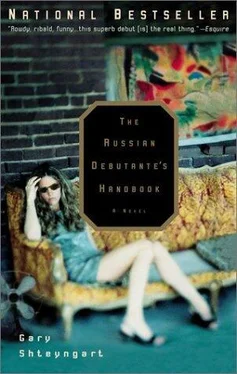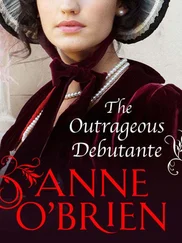Gary Shteyngart - The Russian Debutante's Handbook
Здесь есть возможность читать онлайн «Gary Shteyngart - The Russian Debutante's Handbook» весь текст электронной книги совершенно бесплатно (целиком полную версию без сокращений). В некоторых случаях можно слушать аудио, скачать через торрент в формате fb2 и присутствует краткое содержание. Город: New York, Год выпуска: 2003, ISBN: 2003, Издательство: Riverhead Books, Жанр: Современная проза, Юмористическая проза, на английском языке. Описание произведения, (предисловие) а так же отзывы посетителей доступны на портале библиотеки ЛибКат.
- Название:The Russian Debutante's Handbook
- Автор:
- Издательство:Riverhead Books
- Жанр:
- Год:2003
- Город:New York
- ISBN:0-7865-4177-6
- Рейтинг книги:4 / 5. Голосов: 1
-
Избранное:Добавить в избранное
- Отзывы:
-
Ваша оценка:
- 80
- 1
- 2
- 3
- 4
- 5
The Russian Debutante's Handbook: краткое содержание, описание и аннотация
Предлагаем к чтению аннотацию, описание, краткое содержание или предисловие (зависит от того, что написал сам автор книги «The Russian Debutante's Handbook»). Если вы не нашли необходимую информацию о книге — напишите в комментариях, мы постараемся отыскать её.
and
. The Russian Debutante’s Handbook Bursting with wit, humor, and rare insight,
is both a highly imaginative romp and a serious exploration of what it means to be an immigrant in America.
The Russian Debutante's Handbook — читать онлайн бесплатно полную книгу (весь текст) целиком
Ниже представлен текст книги, разбитый по страницам. Система сохранения места последней прочитанной страницы, позволяет с удобством читать онлайн бесплатно книгу «The Russian Debutante's Handbook», без необходимости каждый раз заново искать на чём Вы остановились. Поставьте закладку, и сможете в любой момент перейти на страницу, на которой закончили чтение.
Интервал:
Закладка:
“My mother. She’s all alone. My father’s dead. She’s dying slowly. Cirrhosis. Emphysema. Dementia. Her pension comes out to thirteen dollars a month. I send her half my paycheck, but I still worry. Maybe I should move her out here someday.” And here Kostya sighed the familiar sigh of Vladimir’s Russian clients at the Emma Lazarus Society; the lung-emptying sigh that comes with a lead weight attached to the neck. The flaxen-haired gangster had gone quite soft on his mama.
“Do you ever think of going back to Russia?” Vladimir said, wishing instantly he could retract those words because the last thing he wanted was for Kostya to leave.
“Every day,” Kostya said. “But I could never find anything in Petersburg or Moscow that pays quite so much. The mafiya is certainly over there…” Kostya paused, as they both reflected upon that single, unmentionable word. “But it’s much more dangerous. Everyone’s ready to reach for their guns. Here, things are calmer, the Stolovans are better at keeping order.”
“Yes, the Groundhog certainly seems like a pleasant individual,” Vladimir said. “I doubt that there’s anyone bent on causing him harm. Or his associates.”
Kostya laughed, twisting his tie around his fingers like a little boy given his first clip-on. “Are you trying to ask me something?” he said. A second, uninvited round of cognacs had arrived. “Truthfully, there are some Bulgarians who aren’t terribly happy about how he’s cornered the high end of the strippers’ market, but these are just little grudges that can be solved with a few bottles of this…” He lifted his glass. “No need for the bullets.”
“None,” Vladimir said.
Kostya looked to his watch. “I must go to a meeting,” he said. “But we should do this regularly. Oh, and also, do you run?”
“Run?” Vladimir said. “Like to catch a bus?”
“No, to build physical endurance.”
“I don’t have any physical endurance,” Vladimir said.
“Well, it’s settled then. Next week we’ll go running. There’s a nice little trail in back of the compound.” They shook hands, and Kostya wrote down directions to the expatriate place on a napkin. It was called Eudora Welty’s. Then, true to form, the energetic young man got up and ran down the street, rounding the corner in no time.
Vladimir yawned spectacularly, finished off his cognac, then waved the waiter over for the bill, which came out to a little over three dollars. It was time to meet the Gringos.
20. THE WRITER COHEN
BY THE TIMEhe found the subterranean Eudora’s, Vladimir was already lost in the vast gastronomical abyss between lunch and dinner. Six souls remained in the restaurant’s cavernous digs, which suggested the place was once something other than the Cajun expat emporium it had become—perhaps a torture chamber where Catholics and Hussites hanged each other by the nose hairs from the barrel-vaulted ceiling. Now the only sign of tortured religiosity was the one advertising seared monkfish on a bed of fennel.
A waitress came to meet Vladimir. She was young, nervous, American, with a short, grizzly haircut, and dressed in some kind of kilt. She had the bad manners to call Vladimir “hon,” as in “Have a seat, hon.” She was Southern, too.
Vladimir perused the menu and his compatriots in late dining. To his immediate left was a table of four women and a dozen empty beer bottles. The women were dressed for the seventy-degree weather in engineer boots, corduroys, and T-shirts of various gloomy hues: hospital dun, narcolepsy gray, the black of the void. They talked so softly that Vladimir was unable to catch a single word despite their proximity, and they all looked terribly familiar, as if they had gone to Vladimir’s Midwestern college. He felt the urge to sneeze out the school’s name to see if he would get a response.
The remaining customer was a beautiful fellow: slender and pale, broad-shouldered and leonine with a bell-curve mane of heavy light-brown hair that was surely the sign of a healthy organism. If scholars of beautiful people could raise any objections to this gentleman it might be the slightly aquiline nose—what does the lion need of the eagle?—and also the awkward fuzz covering his chin that made it possible to imagine his physiognomy with either a real beard or no beard, but certainly not with this sad moss.
The fellow was scribbling away in a notepad, the requisite empty beers were lined up on the table, his cigarette was on autopilot, smoking away in the grooves of the ashtray, and now and again his gaze would travel the restaurant, casually brushing past the table populated by the opposite sex.
Vladimir ordered a dish of pit-barbecued pork and a mint julep. “And what’s the beer everyone’s drinking here?” he asked the waitress.
“Unesko,” she said and smiled. He had betrayed himself as a newcomer.
“Yes, one of those too.”
He rummaged his satchel for his thick, shaggy notebook, a holdover from college: a poem here, a stab at fiction there. He threw it down so that its spine would ring against the table, then did his best to seem impervious to the stares of the women’s table and the young Hemingway across the room. He took out his marble Parker, embossed with the logo of Mother’s corporation, and he smiled at it. Or rather, to it.
To those who have observed Vladimir throughout the years, it would have appeared his standard smile, the weight of it sunk into his jutting lower lip and the hazy, peaceful green eyes. But Vladimir (through reading too many bad novels, perhaps) believed that a smile could convey an entire story if only he sighed and shook his head with good humor at the right moments. In the instant case, Vladimir hoped this smile would say, “Yes, we have been through a lot together, this pen and I. We have kept each other from falling apart through all the strange, self-inflicted years. Portland, Oregon; Chapel Hill, North Carolina; Austin, Texas; then, of course, Sedona, Arizona. Maybe Key West. Hard to remember. Lots of barely functioning cars, women who didn’t care, bands that fell apart because the personalities involved were just too strong. And through it all: the pen. Writing. I am a writer. No, a poet.” He had heard that poetry had cachet here. Everybody was rhyming, jazz clubs were branching out into poetry slams. But then he had to distinguish himself… “I am a writer-poet. No, a novelist-poet. But for a living I make investments. A novelist-poet-investor. Plus I do dance improv.”
Vladimir was smiling at his pen for too long now. Enough with the pen already. He lowered himself into a poem. It was a poem about Mother; it came easy, Mother lent herself well to verse. His two drinks arrived and the waitress smiled at his efforts. Yes, they were all in this together.
He was making good time, describing how his mother looked in a Chinese restaurant, using such imagery as “a small string of pearls from her birthland,” which had scored good marks from a comparative literature professor back at the Midwestern college. Then tragedy struck. His globetrotting pen ran out. Vladimir shook it as gracefully as he could, then started aheming to the Eudora Welty’s other artist-in-dining. The fellow would not respond, lost (or pretending to be lost) in work, he narrowed his eyes and shook his head at the words before him as if they were his undoing. He bunched up his mane with both hands then let it unravel—it unraveled very elegantly, like a Chinese fan. He sighed and shook his head with good humor.
The women’s collective, however, responded by hushing their already subsonic conversation. They looked at Vladimir and his pen with great mystery and worry as if they were lost tourists confronted with a spontaneous native dance on a street far from the safety of their Hilton. Vladimir picked up his beer, his sole credential, and walked over to the women. “Pen?” he said.
Читать дальшеИнтервал:
Закладка:
Похожие книги на «The Russian Debutante's Handbook»
Представляем Вашему вниманию похожие книги на «The Russian Debutante's Handbook» списком для выбора. Мы отобрали схожую по названию и смыслу литературу в надежде предоставить читателям больше вариантов отыскать новые, интересные, ещё непрочитанные произведения.
Обсуждение, отзывы о книге «The Russian Debutante's Handbook» и просто собственные мнения читателей. Оставьте ваши комментарии, напишите, что Вы думаете о произведении, его смысле или главных героях. Укажите что конкретно понравилось, а что нет, и почему Вы так считаете.












